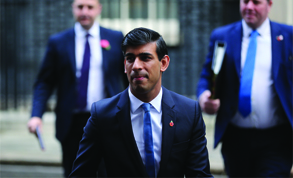Government must acknowledge scale of NHS problems
In a set piece speech on Wednesday, Mr Sunak (pictured) made tackling waiting lists one of his five key pledges, which he suggested the public should hold him to account on. But he gave little detail on this or on the pressures on emergency care, other than to say he was taking ‘urgent action’. He also said the NHS should stop cancelling electives.
But his approach came under fire from Chris Thomas, head of the Institute for Public Policy Research’s Commission on Health and Prosperity said Mr Sunak had ‘said nothing to suggest he’s grasped the full gravity of the NHS’s steady collapse’.
‘Put simply, the NHS is no longer a universal healthcare service for many. If you can’t get a GP appointment for weeks, can’t get an ambulance in time, can’t find a dentist or can’t get admitted into A&E, do you really heave meaningful healthcare coverage for all?’ he added.
‘The human cost of NHS collapse is evident. But there’s also an economic cost, with record numbers now out to work because of long-tern sickness. Proper investment in the nation’s health is needed.’
Matthew Taylor, chief executive of the NHS Confederation, said NHS leaders will be questioning whether Mr Sunak’s government had understood the sheer scale of demand versus the capacity of the health service to deliver.
‘The prime minster cannot afford to simply wish this crisis away. We need clear leadership from across government over a sustained period. But our starting point has to be to acknowledge the problem otherwise we cannot possibly begin to solve it,’ he said.
He urged the government to negotiate a swift end to the NHS industrial dispute and to deliver on the promised workforce plan, as well as addressing the 160,000 vacancies in social care.
And NHS Providers’ director of communications Adam Brimelow said that the speech was ‘short on detail’. ‘These are extremely testing times for a health service under unprecedented pressure and we must be realistic about what can be achieved under current conditions,’ he said. He urged government and unions to talk about pay to avert more strikes.
Mr Sunak’s comments led to the Royal College of Nursing (RCN) writing to him calling for action to tackle ‘the crisis engulfing the NHS’ and to reopen negotiations to avoid strike action later this month.
In the letter, RCN general secretary and chief executive Pat Cullen wrote: ‘Nursing staff are being forced to care for patients in corridors and other inappropriate locations against their own clinical judgement. This practice is grossly unsafe for the patient and the registered professional alike and the risk to life is severe. Furthermore, nursing these patients, many of whom are elderly and vulnerable, in such conditions is undignified and demeaning and should not be tolerated.’
Related content
The Institute’s annual costing conference provides the NHS with the latest developments and guidance in NHS costing.
The value masterclass shares examples of organisations and systems that have pursued a value-driven approach and the results they have achieved.